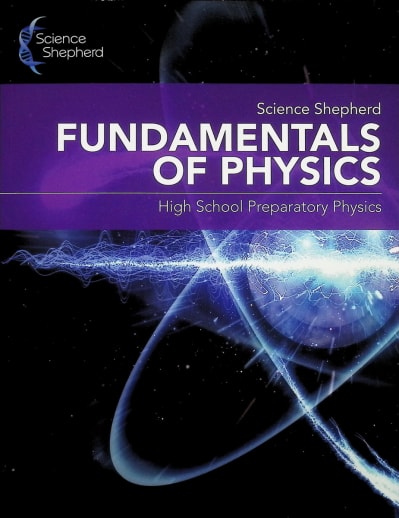Conversationally written to the student, the Fundamentals of Physics Textbook contains fourteen chapters that teach introductory physics. Each chapter begins with a key chapter preview and ends with a notable person of science, a review of key points, definitions, and study questions. Topics include the scientific method, standardized measurement and data collection, matter (solids, liquids, gases), kinetic energy and potential energy, forces, mechanical equilibrium, Newton's laws of motion, gravity, waves, sound, light, color, and radioactive physics. The text concludes with a brief history of science and scientists through a biblical worldview and provides readers with applications of physics that support God's creation of the universe. Answers to the study questions are found in the Fundamentals of Physics Answer Key and Parent Companion. Labs are not included in the textbook; rather, they are found in the recommended Interactive Notebook Physical Science, which uses commonly found items and covers the key principles taught in this course. To complete the course, you will also need the Fundamentals of Physics Answer Key and Parent Companion and the Fundamentals of Physics Test Booklet. These items are sold individually or as a Fundamentals of Physics 3-Book Set.
Science Shepherd Fundamentals of Physics Textbook
Product Overview
- Rigorous general physics course written from a biblical worldview
- Designed for independent learning for science-minded middle schoolers or early high schoolers
- One of three required resources, the Student Textbook is written conversationally with helpful illustrations
Description
The homeschool Physics Textbook from Science Shepherd teaches students the basics of middle school physics, while introducing the more advanced principles needed for higher-level science. Designed for independent study.
It is hard to not fall in love with a course that begins, "A physician writing physics? How does he know anything about physics?" Continuing, the author explains that we are specializing ourselves out of the ability to appreciate and understand any subject, he reinforces the fact that we can learn anything if we are purposeful and devoted to learning the subject. While this may seem like a laborious introduction, for many of us, learning physics seems overly complicated, and I greatly appreciate the efforts Dr. Hardin has taken to write a comprehensive, engaging, and understandable physics course!
Written from a biblical worldview, Science Shepherd Fundamentals of Physics introduces students to the general study of physics as well as to specific topics such as the scientific method, standardized measurement and data collection, matter (solids, liquids, gases), kinetic energy and potential energy, forces, mechanical equilibrium, Newton's laws of motion, gravity, waves, sound, light, color, and radioactive physics. The course concludes with a brief history of science and scientists through a biblical worldview and provides readers with applications of physics that support God's creation of the universe. Labs are not included in the Textbook; rather, they are found in the optional (recommended) Fundamentals of Physics Lab Manual, which covers the key principles taught in the course.
There are three required components for this rigorous middle school course. The Fundamentals of Physics Student Textbook, the Fundamentals of Physics Answer Key and Parent Companion, and the consumable Fundamentals of Physics Test Booklet. These components are available individually or in a convenient Fundamentals of Physics Set.
Optional resources include the Fundamentals of Physics Workbook and the Workbook Answer Key, which are companions to the Fundamentals of Physics Digital Course available from Science Shepherd. This is a rigorous course that homeschool families will appreciate for its clear explanations, ease of use, and excellent preparation for high school science study. It may also function as an excellent introductory physics course for 9th-10th grade. ~Deanne
| Product Format: | Paperback Book |
|---|---|
| Grades: | 7-10 |
| Brand: | Science Shepherd |
| ISBN: | 9798985835830 |
| Length in Inches: | 11.0625 |
| Width in Inches: | 8.6875 |
| Height in Inches: | 0.5625 |
| Weight in Pounds: | 1.65 |

